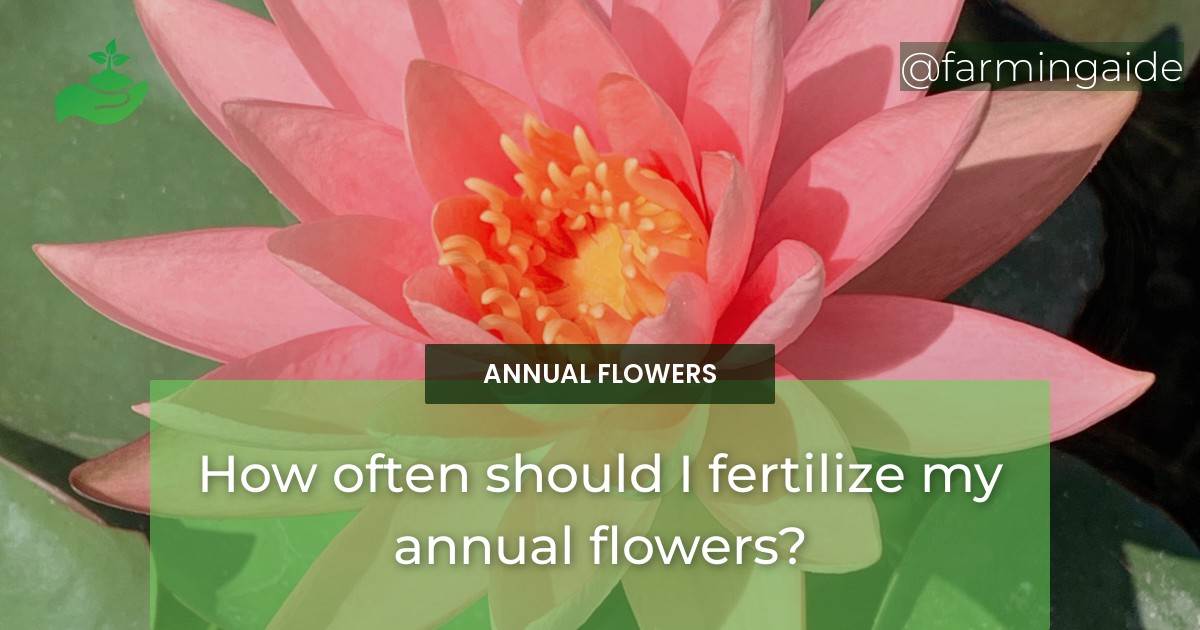Fertilizing annual flowers is essential for their healthy growth. It provides the plants with necessary nutrients that they need to bloom and thrive. However, many gardeners are unsure how often they should fertilize their annual flowers, and what type of fertilizers to use. In this article, we will explore proper fertilization frequency and types of fertilizers for annual flowers.
Importance of Fertilizing Annual Flowers
Fertilizing annual flowers is essential for their growth and overall well-being. Without proper nutrients, the plants will not develop correctly, and their blooms will be stunted. Fertilization helps to promote healthy growth, ensure the production of vibrant blooms, and prevent diseases.
Factors that Affect Fertilizer Frequency
Climate
The climate in your region plays a significant role in determining how often you should fertilize your annual flowers. In regions with hot temperatures, the soil can lose nutrients quickly, while in colder regions, the nutrients may remain in the soil for longer periods.
Soil Type
The type of soil in your garden also affects fertilizer frequency. Sandy soils lose nutrients faster than clay soils, so they will need to be fertilized more frequently.
Plant Variety
The type of annual flower you are growing will also determine how often you should fertilize. Some plants require more frequent fertilization than others to promote healthy growth and flowering.
When to Fertilize Annual Flowers
Before Planting
It is essential to prepare the soil before planting your annual flowers. Adding compost or organic matter to the soil before planting helps to provide the necessary nutrients and can reduce the frequency of fertilization during the growing season.
During Blooming Season
Annual flowers should be fertilized during the blooming season to promote healthy growth and vibrant blooms. However, be careful not to over-fertilize, as this can lead to excessive foliage growth and reduced blooming.
Before Dormancy
Before the dormant season, add a slow-release fertilizer to the soil to provide nutrients to the plants throughout the winter months.
Types of Fertilizers for Annual Flowers
Organic Fertilizers
Organic fertilizers, such as compost, manure, and bone meal, are derived from natural sources and are an excellent option for those who prefer an organic approach to gardening. Organic fertilizers release nutrients slowly and improve soil structure and moisture retention.
Inorganic Fertilizers
Inorganic fertilizers, such as chemical-based fertilizers, are derived from synthetic sources and are designed to release nutrients quickly. They are an excellent option for gardeners who want fast results and easy application.
Tips for Proper Fertilization of Annual Flowers
Choosing the Right Fertilizer
Choose a fertilizer that is specifically formulated for the type of annual flowers you are growing. Read the label carefully to ensure that it contains the necessary nutrients for your plants.
Applying the Right Amount
Applying too little or too much fertilizer can harm your plants. Follow the instructions on the fertilizer label carefully, and measure the correct amount using a measuring cup or scale.
Application Methods
There are several ways to apply fertilizer to your annual flowers, including broadcasting, banding, and side dressing. Choose the method that works best for your garden and follow the instructions carefully.
Common Mistakes to Avoid when Fertilizing Annual Flowers
Over-Fertilization
Over-fertilization can cause excessive foliage growth at the expense of blooms. It can also lead to root burn and other plant diseases.
Under-Fertilization
Under-fertilization can cause slow growth, weak stems, and poor blooming.
Not Following Instructions
Always read and follow the instructions on the fertilizer label carefully. Applying too little or too much fertilizer can cause harm to your plants.
Will Growing Annual Flowers in Containers Require More or Less Frequent Fertilization?
When it comes to growing flowers in containers, the frequency of fertilization will depend on various factors such as the type of flowers, size of the containers, and the type of potting soil used. Generally, since the nutrients get depleted more quickly in containers, more frequent fertilization may be necessary.
Conclusion
In conclusion, fertilizing annual flowers is essential for their healthy growth and vibrant blooms. Choosing the right fertilizer, applying the correct amount and frequency, and avoiding common mistakes will help to ensure that your annual flowers thrive throughout the growing season.


